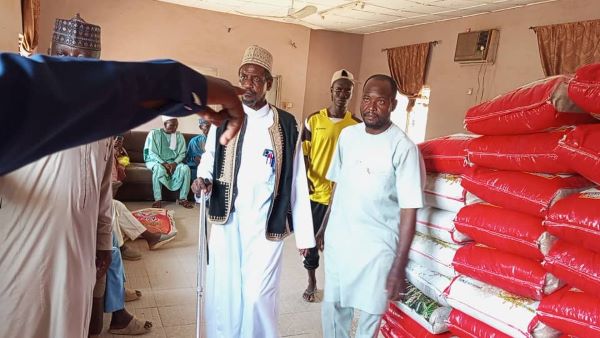In human relationships, the threads of shared experiences and mutual respect often weave the most enduring bonds. This notion is poignantly illustrated through the actions of Tajudeen Abbas, the esteemed Speaker of the House of Representatives, who recently reaffirmed his commitment to maintaining connections with his former colleagues at Nuhu Bamalli Polytechnic, Zaria. Abbas, who served as a dedicated member of the academic staff when the institution was still known as Kaduna State Polytechnic, has demonstrated that the passage of time and changes in professional roles need not sever the ties forged in shared endeavours.
The journey of Tajudeen Abbas is emblematic of the transformative power of education and the impact of dedicated service. His tenure at Kaduna State Polytechnic was marked by a commitment to academic excellence and a genuine concern for the welfare of both students and staff. This foundational experience not only shaped his professional trajectory but also instilled in him a profound appreciation for the community that nurtured his growth. As he ascended to the high office of Speaker of the House of Representatives, Abbas carried with him the values and lessons learned during his time at the Polytechnic.
The nurturing environment of Nuhu Bamalli Polytechnic, with its diverse community of educators and learners, served as a crucible for Abbas’s development. The relationships he cultivated during this formative period were not merely professional; they were imbued with a sense of camaraderie and shared purpose. It is this spirit of connection that has prompted him to reach out to his former colleagues, even as he navigates the complexities of national governance.
In a remarkable display of goodwill, Speaker Abbas chose the festive occasion of Sallah to express his appreciation for his former colleagues at Nuhu Bamalli Polytechnic. His decision to distribute 50kg bags of rice to each former staff member is more than a mere act of charity; it is a reaffirmation of the bonds that have endured despite the passage of time. In many cultures, the act of sharing food during festive occasions symbolizes unity, prosperity, and goodwill. By providing these gifts, Abbas not only acknowledges the significance of Sallah but also reinforces the idea that true leadership is rooted in empathy and community.
The distribution of rice, a staple food in many Nigerian households, resonates deeply within the cultural context of the region. It is a gesture that transcends material value, embodying the spirit of giving and the importance of communal ties. For the recipients, these bags of rice represent more than sustenance; they serve as a reminder of the enduring relationships that have shaped their lives and careers. In a world often characterized by individualism and competition, Abbas’s actions stand as a testament to the power of collective memory and shared experiences.
In an era where professional relationships can often be transactional, the commitment demonstrated by Speaker Abbas serves as a reminder of the importance of nurturing connections that transcend career trajectories. The bonds formed in academic settings are uniquely potent; they are grounded in collaboration, mentorship, and shared aspirations. By maintaining his relationships with former colleagues, Abbas not only honors his past but also enriches his present and future.
The act of giving back to his former institution and its staff underscores a fundamental principle of leadership: the responsibility to uplift and support those who have contributed to one’s journey. As a public figure, Abbas’s actions resonate beyond the immediate circle of recipients; they send a powerful message to current and future leaders about the significance of community engagement and social responsibility. In a time when political discourse often leans towards division, Abbas’s gesture serves as a reminder that connection and compassion can foster unity and understanding.
The implications of Speaker Abbas’s actions extend beyond the confines of Nuhu Bamalli Polytechnic. They invite a broader reflection on the nature of leadership and the role of public figures in fostering community cohesion. In a nation marked by diverse cultures and traditions, acts of kindness such as these can serve as a bridge, fostering understanding and solidarity among different groups. The distribution of rice, in particular, symbolizes a shared cultural heritage, reinforcing the idea that, regardless of one’s current status, the roots of community remain vital.
Moreover, Abbas’s gesture highlights the importance of supporting educational institutions and their staff, who play a crucial role in shaping the future of the nation. By recognizing the contributions of former colleagues, he not only honors their work but also emphasizes the value of education as a cornerstone of societal progress. This acknowledgment can inspire current educators and staff at Nuhu Bamalli Polytechnic to continue their important work with renewed vigor, knowing that their efforts are appreciated and recognized.
In conclusion, Speaker Tajudeen Abbas’s recent gesture of goodwill towards his former colleagues at Nuhu Bamalli Polytechnic serves as a poignant reminder of the enduring power of relationships forged through shared experiences. His decision to distribute 50kg bags of rice during the Sallah celebration encapsulates the essence of community, empathy, and leadership. In a world that often prioritizes individual achievement over collective well-being, Abbas’s actions stand as a testament to the importance of nurturing connections that transcend professional boundaries.
As we reflect on the significance of his gesture, it becomes clear that true leadership is not merely about authority or power; it is about fostering relationships, uplifting others, and contributing to the greater good. In maintaining the ties that bind him to his past, Speaker Abbas not only honors his own journey but also sets a powerful example for current and future leaders. In doing so, he reminds us all that the bonds of community and the spirit of generosity can illuminate even the most complex paths of our shared human experience.


